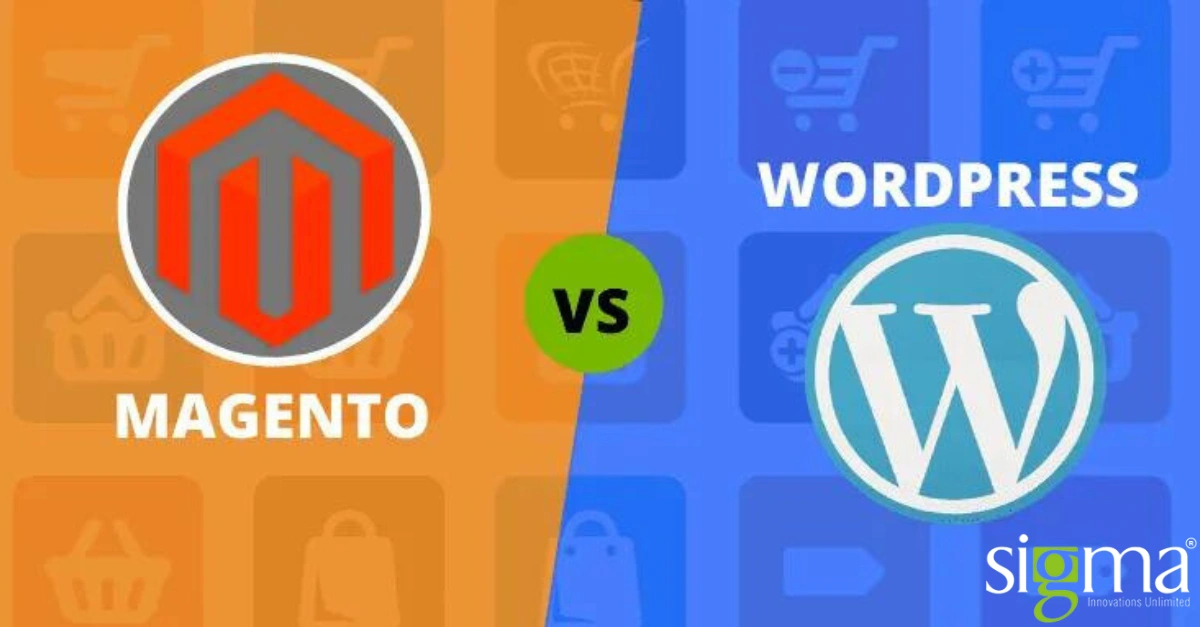Magento Vs WordPress

It is no more a new thing to have a mandatory digital presence of the business in one or the other form. Having a user-friendly, engaging website is a must for the businesses at the present. Usually, to develop and run their websites, developers opt for CMS (Content Management System). A dedicated Content Management System helps the E-commerce stores to run successfully and this is the reason which makes more than half of the businesses across the globe make their digital presence using a suitable CMS.
With the market flooded with different CMS offerings with various features, two CMS i.e. Magento and WordPress have topped the list. Many major businesses across the globe are using either of these CMS for their websites and have achieved global success. Another reason which makes these CMS’ top the list is their open-source availability for free. This availability even helps the small business owners to manage their E-commerce stores easily.
Magento and WordPress sound quite similar but that’s not the truth. Both the CMS have their own specific set of features that are meant for specific kinds of websites. So, the right choice of CMS depends upon your businesses’ purpose and goal. Just get the answer to this simple question and you will get clear with which CMS to choose:
“What is the purpose and role your website will be performing?”
Getting the answer to this question will help a lot in selecting the best CMS for your website. Now, let’s look at the difference in the features of Magento and WordPress:
Magento: A powerful E-commerce Platform
Launched in the year 2008, Magento quickly became one of the most loved CMS for the E-commerce website. Magento is available in Two versions: Magento 1 and Magento 2. Many big brands like Samsung, Nike, Ford, Lenovo, etc. are using Magento for running their E-commerce stores. Magento comes with athe list of features which are suitable for businesses of all range i.e. small, medium to large. Magento’s Open Source edition is perfect for businesses of small scale whereas Magento Commerce is best suitable for businesses of large scale.
Magento provides everything a company requires to build a fully functional and responsive E-commerce store like responsive design, user-friendly management panel, high website performance, tools for analytics, reports, sales, and marketing. You can even create simple or complex CMS pages such as Contact US, About Us, Privacy and Policy, Terms and Conditions and so on.
Magento provides two distinct platforms: Magento Open Source (previously Magento Community Edition) and Magento Commerce; the latter is available in an on-premises version (previously Magento Enterprise Edition) or as a platform-as-a-service (previously Magento Enterprise Cloud Edition). There were also two former platforms, Magento Professional Edition, and Magento Go.
WordPress: A Paradise for Bloggers
Launched in the year 2003, WordPress has become a favorite of businesses quickly. Although it is basically for blogging, WordPress offers many other functionalities also. It supports many various types of website content like forums, mailing lists, media galleries, etc.
Many big brands like eBay Inc. etc. use WordPress for blogging. WordPress is extremely easy to use, comes with complete website optimization for its users. It comes with 56,000 plugins excluding the ones made with third-party developers.
| Factors | Magento | WordPress |
| Goal | Online Sales | Content Marketing |
| Development | Advanced, less flexible | Flexible |
| SEO | Free basic optimization | Free basic optimization |
| Security | Secure | Secure |
Magento Vs WordPress: Goal
If your primary goal of setting up a website is building online sales, then Magento is the best choice for you. And, if you want to do content marketing and digital publishing, then WordPress is the best CMS for you.
Magneto gives you two hosting options; Managed Cloud Hosting with Magento Commerce and Self-hosted route with Magento Open Source. Similarly, you can host your WordPress website at WordPress.com or host your own WordPress.org site.
Magento Vs WordPress: Development
Analyzing both CMS from a development perspective, Magento is more advanced as compared to WordPress. Magento focuses primarily to be an enterprise level E-commerce platform and is not as flexible as WordPress. Both Magento and WordPress feature built-in REST APIs enhancing the capability beyond the code.
WordPress is much more flexible to use even for newcomers whereas Magento requires a little bit of practice to get used to its functioning.
Magento Vs WordPress: Security
Both Magento and WordPress are pretty safe as their core coding is highly secure. Magento and WordPress continuously make improvements in their coding to provide the highest possible security to their clients.
However, the security of an E-commerce store also depends upon the plugins, themes and add-ons a user chooses and how well you manage the server security while hosting the website on your own. So, to be free of this tension, it is recommended to opt for a managed hosting solution.
Magento Vs WordPress: SEO
Both Magento and WordPress come with quite good SEO options which are basic and can be improved further with plugins and a few tweaks.
While using Magento to build a website, it is recommended to select a theme that is well-scripted. And, while adding images to the E-commerce keep in mind to add the title and alt text as it is mostly overlooked while using Magento.
In the case of WordPress, it is important to choose clean-coded themes and install the very popular plugin i.e. is Yoast Plugin to manage the per-page optimization details such as page title, meta descriptions, image name, etc.
Similarities between Magento and WordPress
Let’s look at the similarities between both these powerful CMS:
● Offer a free Open Source edition
● Highly customizable
● SEO and mobile-friendly
● Wide variety of themes and plugins
● Offer Content Management system
● Strong community
Final Words
Magento and WordPress can be used in tandem. In such a situation, Magento is used as a primary solution to manage the store and design. The frontend of the WordPress will be left behind while leveraging its powerful content marketing blogging features.
If you are just launching your business, then it is highly suggested to focus either on product sales or on content marketing strategy. Once this decision is taken then, you can easily select the best CMS for your E-commerce store and experience the benefits.
Thus, we made it very much clear that Magento is the more efficient and recommended alternative to WordPress when it comes to selling products online, but it is also far more complex and requires the expertise of a professional which can be pretty expensive. As WordPress continues to evolve, we can expect better solutions for the larger businesses, and easier to use management tools that may change the situation in favor of WordPress. Until that happens, WordPress will continue to provide a reliable content marketing channel while Magento remains the ultimate choice for selling products online.

